Summary
FOR LIVE COVERAGE SCROLL DOWN
MSPs took evidence on legislation proposing an opt-out register for organ donation
The first minister and Scottish party leaders expressed their condolences to the people of Paris, following last Friday's terrorist attacks
MSPs debated how best to scrutinise intergovernmental relations
The evening's member's debate celebrated Universal Children's Day 2015
Live Reporting
Craig Hutchison
Postpublished at 11:46 GMT 17 November 2015
Tissue donation as opposed to organ donationpublished at 11:41
11:41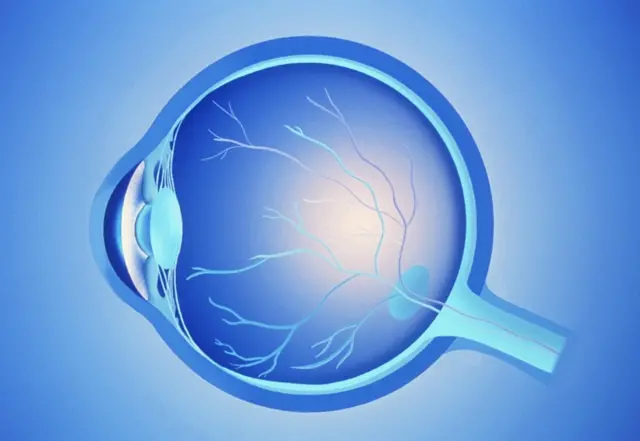 Image source, SPL
Image source, SPLImage caption, The MSPs focus on body parts, including eyes
SNP MSP Dennis Robertson asks about tissue donation as opposed to organ donation.
He asks if fewer people are signing up to cornea donation for example.
Dr Robertson says she does not have those figures to hand.
Dr Cant says the figures show there is strong support for the principle of donation but with the trauma of death that calm reasoning comes under attack through emotion.
Concern that the proxy issue dominates the debatepublished at 11:3711:36
11:3711:36Mr McNeil asks are there any concerns that the debate around proxies could harm the debate around organ donation?
Dr Cant says "yes" that is a concern, from a media point of view the issue of a proxy is contentious.
He says the proxy is an important fail safe for certain elements of the community.
Dr Robertson says there is a concern that the proxy is dominating the coverage rather than organ donation, citing the radio this morning.
Postpublished at 11:40 GMT 17 November 2015
11:40 GMT 17 November 2015BACKGROUND: Wales has taken a different approach to organ donation - what is it?published at 11:39 GMT 17 November 2015
11:39 GMT 17 November 2015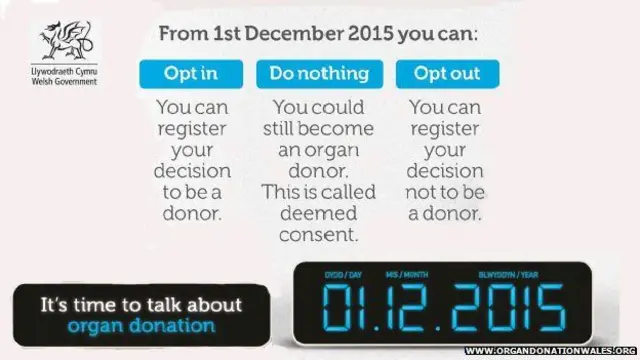
New organ donation rules which presume consent were finalised by the Welsh Assembly last month.
A system of presumed consent will take effect on 1 December, where people will have to opt-out if they do not want their organs used after death.
Living donors who lack the mental capacity to express a view could also be deemed to consent to donation by experts acting in their best interests.
Health Minister Mark Drakeford said the "fundamental change" gave hope to over 200 people in Wales needing new organs.
Committee discusses the issue of the donor proxypublished at 11:34
11:34Labour MSP Rhoda Grant says if someone has opted in they do not need a proxy, if they have opted out they don't need a proxy so the only time a proxy is needed would be if your not registered as a donor and then you would not have a proxy.
Dr Cant says the role or a proxy would be like giving someone the power of attorney.
Postpublished at 11:29 GMT 17 November 2015
11:29 GMT 17 November 2015An opt-out system would make it easier to approach a family - BMApublished at 11'26
11'26Dr Sue Robertson says she works with patients waiting for transplants.
She says specialists involved in the organ donor programme are very well trained to alleviate the stresses families losing a loved one face.
Dr Robertson says an opt-out system would make it easier to approach a family as organ donation will become more normal.
Time limiting a proxy would be 'eminently sensible'published at 11:21
11:21SNP MSP Bob Doris asks what would happen if the proxy and the family disagreed on the matter of organ donation.
Dr Cant says time limiting a proxy would be "eminently sensible".
He says ideally a proxy and the family should be spoken to, but the patient may not want both to be contacted.
Jordan Linden from the Scottish Youth Parliament says the young people he had spoken to expressed the need for the young person's decision to be final, not that of the family.
Dr Sue Robertson from BMA Scotland agrees saying it must be the person who has died who has their wishes listened to.
Postpublished at 11:21 GMT 17 November 2015
11:21 GMT 17 November 2015Difficulty in finding a proxy or family memberpublished at 11:16
11:16SNP MSP Bob Doris asks about the difficulty of finding a proxy.
Dr Robertson points out that it might be easier to find the proxy rather than a family member, but time issues must be looked at.
Dr Cant says the system must be practical and there are particular groups where a proxy would be the best option.
He says anything that would jeopardise the timeliness of organ donation must be looked at.
Soft opt out will not be a 'magic bullet'published at 11:13
11:13Committee convener Duncan McNeil asks about evidence that public campaigns lead to a sustainable benefit and increase in donation.
Dr James Cant says a soft opt-out will not be a magic bullet but must form part of a far wider campaign on organ donation.
He says the British Heart Foundation believes a soft opt-out must be included in going forward.
Mixed views on the appointment of a proxypublished at 11;10
11;10Lindsay Paterson from the Royal College of Physicians of Edinburgh says her organisation has mixed views on allowing a proxy to be appointed.
There were concerns about what might happen if the proxy disagreed with the family on whether organs should be donated, says Ms Paterson.
She adds that appointing a proxy might lead to delays and complications.
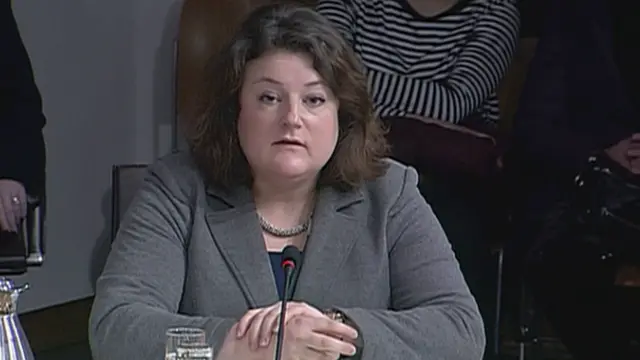
Image caption, Lindsay Paterson is from the Royal College of Physicians of Edinburgh
The Scottish Youth Parliament supports a soft opt-out system and a proxypublished at 11;06
11;06Jordan Linden from the Scottish Youth Parliament says the parliament is in favour of the appointment of a proxy.
Mr Linden says a proxy gives more choice to youngsters who want to donate their organ. The Scottish Youth Parliament says it;
- supports the introduction of a soft opt-out system of organ donation to replace the current opt-in system.
- supports provisions in the Bill that would allow an individual to appoint a proxy to make the final decision regarding transplant on their behalf.
- supports provisions that would limit the role of the family to being consulted on whether they are aware of any unregistered objection to organ donation by the deceased.
- and supports proposals that would allow all those aged 16 and over to be automatically opted-in as organ donors.
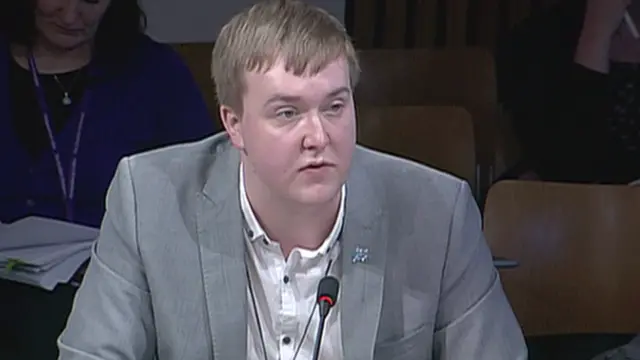
Image caption, Jordan Linden is from the Scottish Youth Parliament
Committee told that a 'balance must be struck'published at 11;04
11;04Dr James Cant from the British Heart Foundation Scotland says a balance between clinical need and protection for certain areas of society must be struck
'Awareness raising is vital', says the Royal College of Physicians of Edinburghpublished at 11:03
11:03Lindsay Paterson from the Royal College of Physicians of Edinburgh says awareness raising among the public is vital.
Committee convener Duncan McNeil asks where the majority of organ donations come from.
Dr Robertson says accidents are one example, as is cerebral haemorrhage but the exact figures are not to hand.
Call for an opt out system - BMA Scotlandpublished at 11:00
11:00Dr Sue Robertson from BMA Scotland says more discussion in the public is always welcome but at the same time a move to an opt-out system would mean organ donation becomes the norm and there would be more organs available to be transplanted to people that need them.
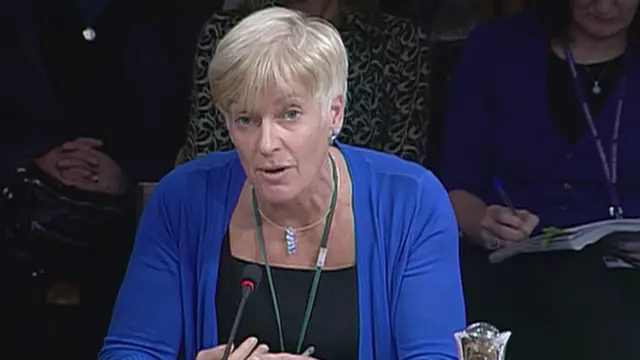
Image caption, Dr Sue Robertson is from BMA Scotland
Doctors care for the family as well as the patientpublished at 11:02 GMT 17 November 2015
11:02 GMT 17 November 2015Labour MSP Rhoda Grant says the bill would change the whole nature of the discussion around organ donation.
Ms Grant says what if a family objects to a donation, would a clinician go against this? She says not.
Dr Robertson says the BMA in Scotland are very clear that if the person involved in that discussion felt it would cause "dreadful distress" to the family they would not go ahead with that donation.
She says doctors care for the family of a patient as well as a patient.
With publicity families will discuss organ donationpublished at 10:54
10:54Dr Sue Robertson, a member of BMA Scottish Council and renal physician in Dumfries, says if the legislation is passed and there is public debate it will remind people to tell families of their wishes.
Dr James Cant from the British Heart Foundation Scotland says given time families will have this discussion.
He says there are clinical nurses who have the skills to liaise with families.
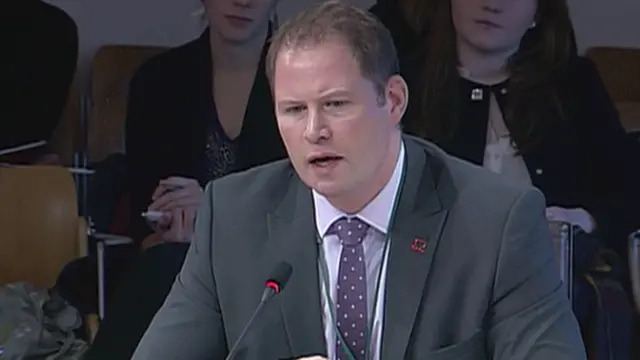
Image caption, Dr James Cant from the British Heart Foundation Scotland
Very difficult to go against the wishes of the family - RCPEpublished at 10:52
10:52Lindsay Paterson from the Royal College of Physicians of Edinburgh says at a time when it is very stressful for families visiting a patient at the end of their life, conversations around organ donation have to be very sensitive.
Ms Paterson says a clinician caring for the patient and speaking to the family would find it very difficult to go against the wishes of the family at that difficult time.
She says clinicians seek the families approval in practice.